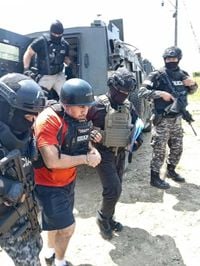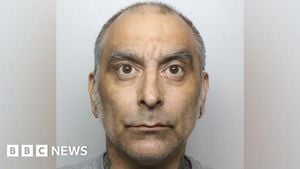Jose Adolfo Macias Villamar, better known as "Fito," the notorious leader of the Ecuadorian gang Los Choneros, was extradited to the United States on Sunday, July 20, 2025, marking a significant development in the ongoing battle against transnational organized crime. His arrival in New York followed a dramatic recapture after more than a year on the run, during which his escape from prison had unleashed violence across Ecuador.
Fito's extradition was the first under a recent constitutional amendment passed in Ecuador, which allows the country to hand over its nationals to foreign justice systems under specific conditions. This legal shift came after a referendum supported by Ecuadorians earlier in 2025, a move President Daniel Noboa hailed as instrumental in bringing the drug kingpin to U.S. soil. "Farewell, Fito," Noboa wrote on social media shortly after the extradition, framing it as a political victory for his administration's offensive against organized crime.
The extradition process itself was swift and highly coordinated. Macias was transferred from a maximum-security prison in Guayaquil to the city’s airport, where he was handed over to U.S. officials. A U.S. Department of Justice plane arrived around 12:45 p.m. local time and departed with Macias shortly after 2 p.m. Ecuadorian prison authorities released photographs showing him escorted by heavily armed National Police agents, clad in a helmet, bulletproof vest, and casual attire.
Since at least 2020, Macias has led Los Choneros, a criminal organization notorious for its violent methods and extensive drug trafficking operations. The U.S. Attorney's Office for the Eastern District of New York indicted him on seven charges related to international cocaine distribution, conspiracy, and firearms violations, including smuggling U.S. weapons to supply hitmen and armed factions in Ecuador. These charges carry penalties ranging from 10 years to life imprisonment, though diplomatic guarantees ensured he would not face life sentences or the death penalty, a key condition for Ecuador's approval of the extradition.
Upon his arraignment in federal court on Monday, July 21, Macias pleaded not guilty to all charges through his lawyer, Alexei Schacht, and with the assistance of an interpreter. Judge Vera M. Scanlon ordered him held without bail at the Brooklyn Municipal Detention Center, citing the high risk he poses to the public and the likelihood of flight. She also mandated that his health issues—including high blood pressure, gastritis, and bullet fragments from a previous shooting—be properly treated while in custody.
U.S. Attorney Joseph Nocella described Macias as the principal leader of Los Choneros, a "notoriously violent transnational criminal organization," and a "ruthless and infamous drug and firearms trafficker." He emphasized that Macias and his co-conspirators "flooded the United States and other countries with drugs and used extreme measures of violence in their quest for power and control." The indictment details how Los Choneros shipped cocaine across the Pacific from Ecuador to the U.S. and obtained American weapons to arm their hitmen. The gang's violent activities extended beyond drug trafficking to include kidnappings, torture, and attacks on law enforcement, politicians, and civilians.
Macías’ criminal career has been marked by audacity and brutality. In January 2024, he escaped from a maximum-security prison in Guayaquil, where he was serving a 34-year sentence for homicide and narcotics trafficking. His escape triggered a wave of violence across Ecuador, including a dramatic hostage situation at a TV station, prompting President Noboa to declare an internal armed conflict and designate Los Choneros and 21 other criminal groups as terrorist organizations. The government deployed military forces, including tanks, to quell the unrest, a move criticized by human rights groups.
After more than a year in hiding, Macias was apprehended on June 25, 2025, in a concealed bunker beneath a luxury mansion in Manabí province. The villa was reportedly outfitted with lavish amenities such as a home gym, marble walls, and a game room, underscoring the wealth and influence he wielded even while a fugitive.
Legal experts and observers note that while Macias’ extradition is a symbolic and practical win for Ecuador’s government, it also highlights systemic challenges within the country’s justice system. Attorney Dolores Miño pointed out that the extradition process requires that the alleged crimes have been committed in the territory of the requesting country, which limits the scope of extradition. More broadly, Miño warned that relying on foreign justice systems to prosecute major criminals reflects a lack of trust in Ecuador’s own institutions, which have been plagued by corruption and collusion with organized crime. Since July 2024, dozens of judges, prosecutors, and judicial officials have been removed from office for such ties, signaling deep-rooted institutional weaknesses.
Despite these challenges, the extradition of Macias is part of a broader U.S. initiative known as Operation Take Back America, aimed at dismantling drug cartels and transnational criminal organizations. The prosecution of Macias is being led by the International Narcotics and Money Laundering Section, with assistant U.S. attorneys overseeing the case. The Bureau of Alcohol, Tobacco, Firearms and Explosives (ATF) has also been involved, with Special Agent in Charge L.C. Cheeks, Jr. emphasizing the agency's commitment to disrupting the cycle of gun violence by targeting those responsible.
Macias’ defense attorney expressed eagerness to review the government’s evidence, stating, "As far as I am aware, he did neither" of the crimes alleged. Meanwhile, the U.S. prosecutors maintain that Macias poses an extraordinary danger to the community and that no conditions of release could guarantee public safety or his appearance at trial.
The case of Jose Adolfo "Fito" Macias Villamar encapsulates the complex and violent nature of drug trafficking networks operating between South America and the United States. It also underscores the international cooperation necessary to confront such transnational threats. As Macias awaits trial, his extradition stands as a stark reminder of the ongoing struggle to bring powerful criminal figures to justice and the challenges faced by countries like Ecuador in reforming their judicial systems to effectively combat organized crime at home.





